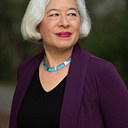Good News About Political Polarization

As I teach people how to communicate across political disagreement, one of the greatest barriers I encounter is pessimism that dialogue is possible, or even desirable. People say they don’t want to deal with people who hold extreme and problematic views. They ask, “Why would I want to talk to those idiots/monsters/racists/snowflakes?”
Granted, some people are truly problematic, but it turns out many of our views of people across the political divide are based in media representations and cognitive biases that distort our perceptions of reality. In the context of political polarization, we are likely to misconstrue people on the other side of the political divide as extreme, uninformed or misinformed, illogical, hateful, and immoral. This gap between our perceptions and reality undergirds affective polarization, the animosity people feel toward those across political lines. Things have gotten so bad that people don’t want to work with, live near, or have their family members marry someone from another political party. This divisiveness threatens our families, friendships, communities, even our democracy.
Fortunately, researchers are finding solutions. In September 2022, I attended a conference called Bridging Divides & Strengthening Democracy: From Science to Practice. This virtual forum was the culmination of a competition to develop and test strategies to reduce partisan animosity and decrease support for undemocratic processes. The organizers put out a call to researchers, received 252 entries, and they tested the interventions in a well-controlled online environment with a large sample (a full write-up of the project is available here).
I was impressed with the rigor of the science, but what really caught my attention were the results. Remarkably, of the 25 interventions they tested, almost every single one was effective in reducing partisan animosity! Many strategies focused on correcting misperceptions — participants were surprised to learn that people on the other side agreed with them on some things, did not support undemocratic processes, and were willing to learn about another perspective. Other approaches humanized people across the political spectrum by showing them sharing struggles, collaborating, and talking about aspects of themselves that were misunderstood. You can learn more about the winning strategies here.
These findings are extremely encouraging. With tools that can reduce partisan animosity, we may be more willing to connect across political disagreement and shift the record high polarization that strains our relationships and our democratic processes.
The science continues to advance. The organizers are in phase 2 of this project, calling for researchers and practitioners to partner together and continue to test the effectiveness of strategies identified in the first phase. Funding proposals are due January 13, 2023. Another project I’m very excited about is accepting proposals for research on intellectual humility, a quality that I believe can help further dialogue across difference. Letters of intent for this funding are due January 15, 2023.
I am sharing this research on bridging political divides for several reasons:
1) I am so enthusiastic about the findings that I cannot contain myself,
2) I hope you will feel more optimistic that we can reduce polarization,
3) I want researchers to be aware of available funding and upcoming deadlines, and
4) I want to bring attention to this work, which has been largely ignored by the media.
Please help get the word out. With these research insights, we can strengthen our relationships, our families, our communities, and our democracy.
Tania Israel is a Professor of Counseling Psychology at the University of California, Santa Barbara and award-winning author of Beyond Your Bubble: How to Connect Across the Political Divide, Skills and Strategies for Conversations That Work (APA, 2020).
Photo by Chris Liverani on Unsplash
